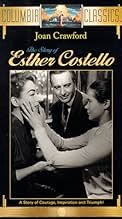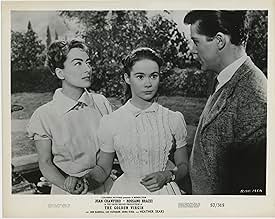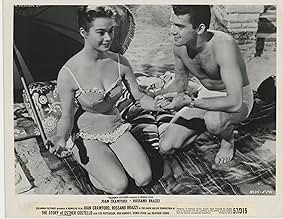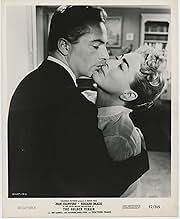NOTE IMDb
6,5/10
1,1 k
MA NOTE
Ajouter une intrigue dans votre langueA wealthy woman aids a deaf-blind teen orphan from her Irish village, becoming a mother figure. She must protect the girl from exploitative promoters and her ex-husband's schemes.A wealthy woman aids a deaf-blind teen orphan from her Irish village, becoming a mother figure. She must protect the girl from exploitative promoters and her ex-husband's schemes.A wealthy woman aids a deaf-blind teen orphan from her Irish village, becoming a mother figure. She must protect the girl from exploitative promoters and her ex-husband's schemes.
- Réalisation
- Scénario
- Casting principal
- Victoire aux 1 BAFTA Award
- 1 victoire et 3 nominations au total
Avis à la une
The subject for the time was a brave, difficult and daring one to tackle and the title role is one that would pose many challenges in terms of how to act it and in the context of the subject. To me, at her best Joan Crawford was a fine actress, especially in melodrama where she was one of the best, although with hit and miss film choices throughout her career and a tendency to overact in comedy. Rossano Brazzi has not really done a lot for me in the past, tend to find him wooden.
Just like the subject, 'The Story of Esther Costello' is a brave and daring film that is appropriately hard to watch (it would have been insulting to sugarcoat or trivialise a subject like this, one that is hard hitting as they come). Am another person that doesn't agree with 'The Story of Esther Costello' being called unintentionally funny and considering the subject and what happens saying that sounds somewhat disrespectful, but maybe that's just me.
By all means 'The Story of Esther Costello' isn't perfect. It does get too heavy on the melodrama at times and has campy parts, namely in the latter stages.
Also felt that the aftermath and consequences of the traumatic event that happens later on (don't want to spoil it) were rather contrived and were not remotely realistic.
Crawford's performance is an emotional powerhouse at its best and to me she didn't overact. Brazzi was a big surprise, he never had a character that was this despicable and he manages to be both charming and genuinely creepy. Not wooden at all. The acting honours, in the most challenging role (playing deaf, or blind, or mute individually is a tough task, it is even tougher when one has to play all three simultaneously like here), is a very intensely moving Heather Sears. The direction is accomplished enough.
Furthermore, 'The Story of Esther Costello' is very handsomely mounted visually and Georges Auric's unsettling score has so much atmosphere. The script is sincere and didn't seem too overwrought or talk-heavy on the most part. The story pulls no punches and it really hit me hard, both in giving me the chills and in tugging at my heart-strings.
On the whole, found a lot to admire even if it didn't completely succeed. 7/10
Just like the subject, 'The Story of Esther Costello' is a brave and daring film that is appropriately hard to watch (it would have been insulting to sugarcoat or trivialise a subject like this, one that is hard hitting as they come). Am another person that doesn't agree with 'The Story of Esther Costello' being called unintentionally funny and considering the subject and what happens saying that sounds somewhat disrespectful, but maybe that's just me.
By all means 'The Story of Esther Costello' isn't perfect. It does get too heavy on the melodrama at times and has campy parts, namely in the latter stages.
Also felt that the aftermath and consequences of the traumatic event that happens later on (don't want to spoil it) were rather contrived and were not remotely realistic.
Crawford's performance is an emotional powerhouse at its best and to me she didn't overact. Brazzi was a big surprise, he never had a character that was this despicable and he manages to be both charming and genuinely creepy. Not wooden at all. The acting honours, in the most challenging role (playing deaf, or blind, or mute individually is a tough task, it is even tougher when one has to play all three simultaneously like here), is a very intensely moving Heather Sears. The direction is accomplished enough.
Furthermore, 'The Story of Esther Costello' is very handsomely mounted visually and Georges Auric's unsettling score has so much atmosphere. The script is sincere and didn't seem too overwrought or talk-heavy on the most part. The story pulls no punches and it really hit me hard, both in giving me the chills and in tugging at my heart-strings.
On the whole, found a lot to admire even if it didn't completely succeed. 7/10
Certainly this is one of Joan Crawford's best movies. She beautiful in the dated "Grand Hotel." She really acts in "The Women." She's fine in the high melodrama of "Possessed." She's very good in "Mildred Pierce." And "Sudden Fear" is a fine noir.
Apart from Ms. Crawford, for the moment, we have the plot: A child in Ireland is in a terrible accident, in which her mother dies. She becomes blind and deaf and loses the ability to speak as a result of the trauma. This, by the way, is the title character, not Ms. Crawford. That was also rare in her career and maybe a first here.
As someone very knowledgeable about the blind, I give this a very high rating. This is only a personal feeling but I prefer it to the famous "Miracle Worker," which to me is overwrought and, though based on a true life, not very accurate.
"The Story of Esther Costello" is accurate. The scenes at the school on Long Island to which Crawford takes Esther, well played by Heather Sears, are believable. The Braille is well researched, as are other aspects of her learning.
As Esther grows up, she becomes a very pretty young m=woman. Without giving away the plot, she is abused and raped. This is sadly still true of the lives of blind woman and women with other disabilities. They are taken advantage of by parents and other relatives, by schoolmates, and very often by spouses. The same is true, to a lesser degree, of disabled men.
Make no mistake: This is no arid treatise. It has its campy moments, as well as its legitimately exciting ones. Among the former are Crawford's swank no matter where she is and the irony of her becoming a sort of foster mother here in light of later revelations by her own daughter.
This is a painful movie but a very fine one.
Apart from Ms. Crawford, for the moment, we have the plot: A child in Ireland is in a terrible accident, in which her mother dies. She becomes blind and deaf and loses the ability to speak as a result of the trauma. This, by the way, is the title character, not Ms. Crawford. That was also rare in her career and maybe a first here.
As someone very knowledgeable about the blind, I give this a very high rating. This is only a personal feeling but I prefer it to the famous "Miracle Worker," which to me is overwrought and, though based on a true life, not very accurate.
"The Story of Esther Costello" is accurate. The scenes at the school on Long Island to which Crawford takes Esther, well played by Heather Sears, are believable. The Braille is well researched, as are other aspects of her learning.
As Esther grows up, she becomes a very pretty young m=woman. Without giving away the plot, she is abused and raped. This is sadly still true of the lives of blind woman and women with other disabilities. They are taken advantage of by parents and other relatives, by schoolmates, and very often by spouses. The same is true, to a lesser degree, of disabled men.
Make no mistake: This is no arid treatise. It has its campy moments, as well as its legitimately exciting ones. Among the former are Crawford's swank no matter where she is and the irony of her becoming a sort of foster mother here in light of later revelations by her own daughter.
This is a painful movie but a very fine one.
Leonard Maltin said that the movie was often "unintentionally funny." Sure, I find rape hilarious. I meant that in a sarcastic way, mind you. I don't know why Mr. Maltin found this film funny, because it isn't. It is about a blind, deaf, and dumb girl named Esther and the way she adapts to society with the aid of a wealthy socialite named Margaret Landi. Joan Crawford and Heather Sears are incredible in their respective roles of Margaret and Esther. Miss Crawford did an amazing job, very unlike anything else she did. I highly recommend this film.
10clanciai
The story is by renowned novelist Nicholas Monsarrat, also known for "The Cruel Sea" and "The Capillan of Malta", two other realistic and documentary novels, but this is not about the war. It's about a deaf and mute poor orphan in Ireland, who is taken care of by Joan Crawford, who makes an unusually impressive performance, without falling into pits of sentimentality and bathos. Heather Sears as the young girl is the chief star of the film, though, unknown and making the performance of her life for a start. The real crushing thing is the story, though. It is devastating in its merciless exposure of commercial exploitation of humanitarianism. The real drama begins as Rossano Brazzi enters the stage. He is a former husband of Joan Crawford, whom she tried to separate from, but when he reappears she is too weak for him, with very unforeseen consequences. The film is beautifully made with brilliant music, and the realism of the story couldn't have been carried through more consistently. I was often irritated with Joan Crawford for her overbearing manners, but here she is quite perfect and admirable all the way.
Shot in the United Kingdom and the continent, The Story Of Esther Costello seems to be a hybrid production of The Miracle Worker and Johnny Belinda. Heather Sears's performance in the title role might have been worthy of Oscar consideration had not Jane Wyman already won an award playing a deaf mute.
Joan Crawford plays a wealthy American who is separated from her husband Rossano Brazzi and touring Ireland, specifically the village of her birth. While there the village priest Denis O'Dea introduces Joan to Sears who is deaf, blind, and mute. In a prologue we see why she is that way, as a child she found a cache of gunpowder and grenades left over from the Rebellion which explodes killing her mother and leaving her as she is.
Eventually Joan takes Heather from the squalid conditions she's living in courtesy of her aunt Maureen Delaney and gives her the Helen Keller treatment. When Sears becomes a celebrity of sorts, Brazzi reenters the picture see the cash cow Sears has become what with the charities organized in her name.
A rather unbelievable 'cure' for Sears mars what could have been a much better drama. The players all perform well, particularly Crawford who is in her best Mildred Pierce mode as an adoptive mother to a much more appreciative child than Ann Blyth.
Definitely one for Joan Crawford fans.
Joan Crawford plays a wealthy American who is separated from her husband Rossano Brazzi and touring Ireland, specifically the village of her birth. While there the village priest Denis O'Dea introduces Joan to Sears who is deaf, blind, and mute. In a prologue we see why she is that way, as a child she found a cache of gunpowder and grenades left over from the Rebellion which explodes killing her mother and leaving her as she is.
Eventually Joan takes Heather from the squalid conditions she's living in courtesy of her aunt Maureen Delaney and gives her the Helen Keller treatment. When Sears becomes a celebrity of sorts, Brazzi reenters the picture see the cash cow Sears has become what with the charities organized in her name.
A rather unbelievable 'cure' for Sears mars what could have been a much better drama. The players all perform well, particularly Crawford who is in her best Mildred Pierce mode as an adoptive mother to a much more appreciative child than Ann Blyth.
Definitely one for Joan Crawford fans.
Le saviez-vous
- AnecdotesJoan Crawford, then on the Pepsi-Cola board of directors, demanded that product placement shots be included in all her films of this era. It is prominently displayed on signs in an airport lobby.
- GaffesWhen the cottage explodes in the beginning of the movie, the right wall falls, revealing the plywood set construction underneath. The stone walls are just paper covering over wood.
- ConnexionsFeatured in Film Preview: Épisode #1.4 (1966)
Meilleurs choix
Connectez-vous pour évaluer et suivre la liste de favoris afin de recevoir des recommandations personnalisées
- How long is The Story of Esther Costello?Alimenté par Alexa
Détails
- Date de sortie
- Pays d’origine
- Langue
- Aussi connu sous le nom de
- The Story of Esther Costello
- Lieux de tournage
- Sociétés de production
- Voir plus de crédits d'entreprise sur IMDbPro
- Durée
- 1h 43min(103 min)
- Couleur
- Rapport de forme
- 1.85 : 1
Contribuer à cette page
Suggérer une modification ou ajouter du contenu manquant




































